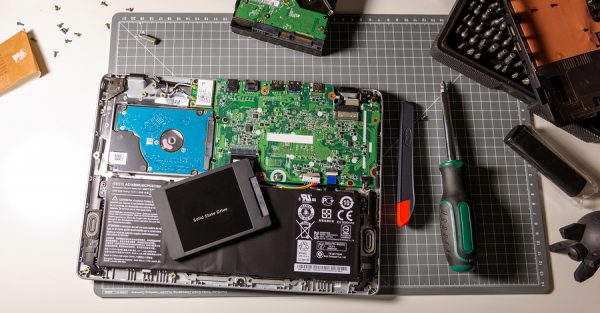
Before agreeing to do business with an e-waste recycler, it’s imperative to learn more about their data destruction practices. Many e-waste recyclers claim to destroy data that is brought in on unwanted electronic devices, but very few actually follow through with this promise. Protect your business–and your sensitive data–by asking e-waste recyclers these questions about their data destruction practices:
How can I verify my data was destroyed?
You should never assume that an e-waste recycler has destroyed the data on your devices simply because they claimed they did. Instead, the e-waste recycler should offer you some sort of proof of the destruction of the data.
ERI’s clients get the opportunity to track their e-waste as it moves through the facility using Optech™. This system is used to inform clients of where their assets are at all times during the destruction and recycling process. Clients can also watch a live video feed of the data on their devices being destroyed. This helps clients overcome their fears that their data will fall into the wrong hands once it is taken to an off-site facility for destruction. In addition to the live video feed, clients will also receive a certificate of destruction for each batch of e-waste they send to one of ERI’s facilities.
If an e-waste recycler cannot verify the destruction of your data, this could indicate that the recycler is not reliable and should not be trusted with your sensitive data.
Does your facility meet data destruction standards?
Ask about the specific data destruction processes used within the facility and find out if they meet or exceed the industry standards. In the past, the standard was the Department of Defense guidelines, which included wiping each device a certain number of times. But now, it’s recommended that you find an e-waste recycler that follows the NIST 800-88r1 Guidelines for Media Sanitization, which is the current industry standard.
Can I trust your employees to handle my sensitive data?
Even if the e-waste recycler’s data destruction practices meet industry standards, you should still ask about their recruiting and hiring processes. After all, it’s important to make sure sensitive data will not be handled by untrustworthy employees.
ERI conducts 7-year criminal history checks on every employee. All employees are also subjected to random drug testing and asked to signed confidentiality agreements. The employees that work in restricted areas with sensitive data must make it through even tougher pre-employment screening processes. These processes have been put in place to ensure that all employees within the ERI facilities can be trusted around sensitive data.
E-waste recycling facilities should also have security systems in place so they can monitor employees. These systems should also prevent unauthorized employees from gaining access to areas of the facility where devices with sensitive data could be stored.
If an e-waste recycler is not committed to hiring hardworking and trustworthy employees, you should not trust them with your company’s sensitive data.
Do you have a data breach response plan in place?
Reliable e-waste recyclers will do everything possible to prevent data breaches from occurring. However, it’s important for e-waste recyclers to still have a response plan in place just in case a breach does occur. Find out if the e-waste recyclers you are interested in doing business with have one of these plans. Ask them to share their plan so you have a better idea of how they will handle this type of situation should it ever occur.
Make sure that the e-waste recycler’s response plan includes information on when and how you will be notified in the event of a data breach. ERI’s employees are trained to report potential issues immediately and make the protection of sensitive data a priority. The response plan also requires the executive team to oversee an investigation into how the breach occurred, the data affected, and how to prevent a breach from happening again in the future.
ERI will also immediately notify clients who may have been affected by the breach in an effort to be as transparent as possible. If your data has breached, ERI will provide you with an overview of the incident, including information on what data was compromised.
Do you have any certifications?
Last but not least, you should always ask e-waste recyclers about their certifications. There are a number of certifications that are only issued to e-waste recyclers that are considered the best of the best. One of these certifications is issued by the National Association for Information Destruction (NAID). The NAID AAA certification is issued to e-waste recyclers that have demonstrated their commitment to protecting sensitive data from the time it arrives at the facility until it has been destroyed. E-waste recyclers cannot be NAID AAA certified without passing a thorough inspection conducted by a professional auditor. The NAID also sends auditors to each certified facility randomly throughout the year to ensure they are still compliant with the rules. E-waste recyclers with this certification can be trusted to properly destroy sensitive data.
The e-Stewards certification is also important in the e-waste recycling industry. This certification is issued to recyclers that have successfully proven that they process all of their e-waste in facilities in the U.S. instead of shipping it to developing countries. The data on your devices will not be safe if the recycler is sending your e-waste overseas, which is why looking for a recycler with this certification is so important.
ERI is the e-waste recycler trusted by countless clients in both the public and private sector. With eight secure facilities located throughout the U.S., ERI the leading e-waste recycler in the country. For more information on data destruction and recycling your electronics, or to request a quote for your company, contact us today.